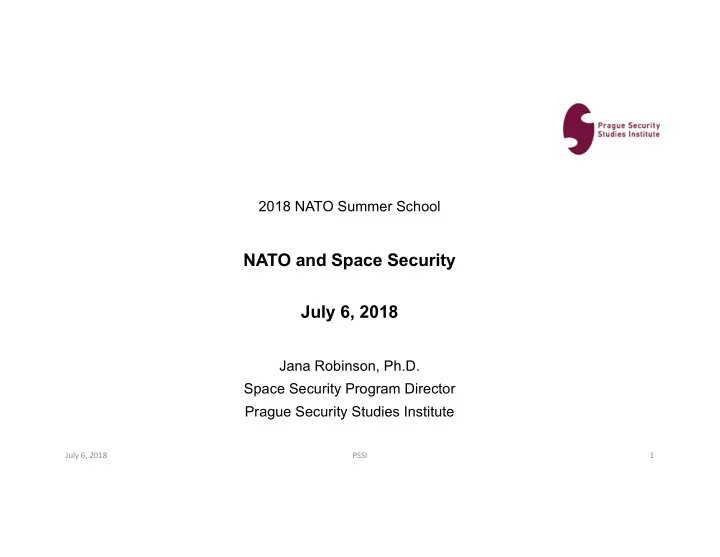

2018 NATO Summer School NATO and Space Security July 6, 2018 Jana Robinson, Ph.D. Space Security Program Director Prague Security Studies Institute July 6, 2018 PSSI 1
Presentation Overview • New Space Security Landscape • Space in Support of NATO • Space As a Priority for NATO? • Beyond Operations and Tactics Toward a Comprehensive Policy? • PSSI Efforts to Strengthen Space Security July 6, 2018 PSSI 2
New Space Security Landscape • Technology and geopolitics are changing the global space security landscape • Space is congested: active satellites (some 1800), space debris • Space is contested: due to high reliance on space for national security, authoritarian space competitors seem intent on testing the resiliency of satellites, ground infrastructure and links using cyber attacks, jamming/spoofing and blinding, orbital manoeuvers, proximity operations and high-altitude ASAT tests, to name a few. • Space is competitive: 12 countries have launch capabilities, more than 70 countries and governmental consortia operate in space, surge of new space companies, competition for orbital slots and satellite radio frequencies • These developments have implications for NATO mission July 6, 2018 PSSI 3
Space in Support of NATO • NATO operations are space enabled (e.g. SATCOM, PNT, ISR, SSA, infrared missile launch warning, weather, etc.). • NATO does not own, or directly operates, on-orbit assets, it relies on national and commercial capabilities • Availability of space capability discretion of the satellite owners (countries, commercial entities) • NATO owns ground segments that receive SATCOM information to support its operations July 6, 2018 PSSI 4
Space as a Priority for NATO? • Space is an operational, warfighting domain • Space-based information required for NATO planning and operations • Space-dependent NATO will be faced with more contested space environment, including space hybrid threats, and will have to consider their national assets’ resiliency and deterrence • NATO will need to understand changing national and international space frameworks, policies, and engagements. • Allied collaboration in space represents a powerful symbol of shared values and transatlantic unity July 6, 2018 PSSI 5
Beyond Operations and Tactics Toward a Comprehensive Policy? • NATO currently does not have comprehensive space framework. • NATO’s 2010 Strategic Concept warns about the deployment of technologies that threaten allied capabilities in space. • Increased awareness about the potential of adversaries seeking to exploit their own access to space for military purposes to the detriment of the Alliance is critical (NATO Allied Joint Doctrine for Air and Space Operations, 2016). • Far more consideration needs to be given to China and Russia as major space competitors (including their global E&F footprint and “space sector capture”) • NATO can build on past efforts in this area (e.g. the NATO Space Handbook of Dec 2013, Allied Joint Doctrine for Air and Space Operations, etc.) July 6, 2018 PSSI 6
Beyond Operations and Tactics Toward a Comprehensive Policy? • At a strategic level: - promote TCBMs, norms of responsible behavior and best practices - enhance and expand space partnerships - contribute to strengthening deterrence of allied space assets - configure cross-domain responses to space hybrid operations and disruptions (including possible future attacks on space assets) • At an operational level: space needs to be fully integrated in NATO planning and command structures. • NATO personnel should be trained to maximize exploitation of space capabilities and operate in a degraded space environment. July 6, 2018 PSSI 7
PSSI Efforts to Strengthen Space Security • Helping expand and deepen space partnerships, including through its high-level Space Security Conference series ongoing since 2011 • Conducting original research with regard to China and Russia’s space-related transactional footprints worldwide and their methods and incentive structures to engage in what we term “space sector capture” under the guise of benign space partnerships. • Research on cross-domain responses to malevolent acts in space, principally via economic and financial penalties on Earth • Highlighting challenges related to space hybrid threats July 6, 2018 PSSI 8
Recommend
More recommend